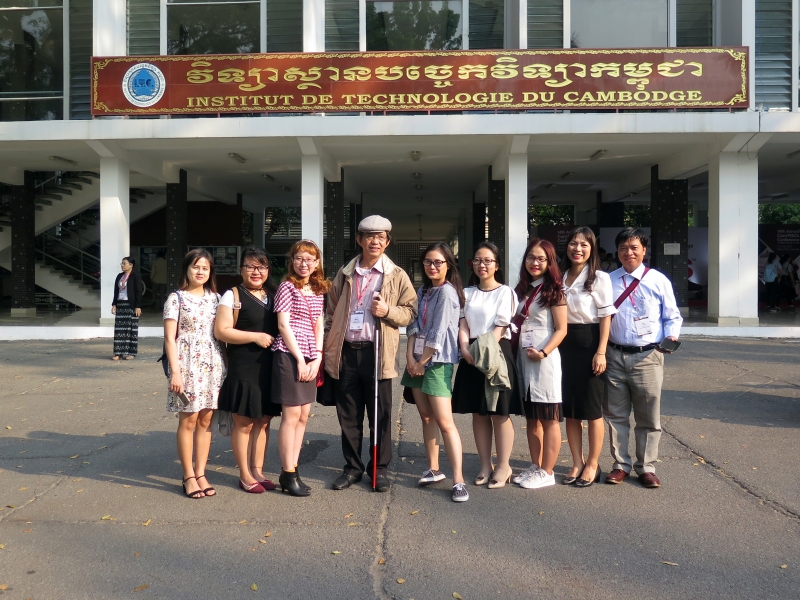Giảng viên và sinh viên Ngành Ngôn ngữ Anh tham gia hội thảo CamTESOL2018
|
Hội thảo CamTESOL 2018 (lần thứ 14 thường niên) về Giảng dạy tiếng Anh, với chủ đề “English Language Teaching in the Digital Era” diễn ra từ ngày 08/02/2018 đến 11/02/2018 tại Phnom Penh, Cambodia. Các giảng viên Nguyễn Thu Hương, Nguyễn Thị Tôn Nữ Phượng Linh, Lữ Văn Tuấn, Võ Thị Kiều Loan, cùng các sinh viên Trần Khánh Thy, Vũ Thị Kiều Anh, Phạm Minh Dạ Yến, Nguyễn Bích Trâm, và Nguyễn Ái Nhi đã tham dự. NỘI DUNG TRÌNH BÀY: Teaching young learners (TYL 55): The attitude of Vietnamese students towards the study of English language in public schools 30 minutes paper Presented by Tran Khanh Thy, Vu Thi Kieu Anh and Nguyen Thu Huong Abstract: Vietnamese students start to learn English as a compulsory subject in school’s curricula since grade three, but most of high school graduates still find difficult to communicate in English. Teachers usually hold the idea that their students learn English to get high scores in paper tests, especially the national high school examination, in which reading skills and sentence-level grammar are tested. Students are also believed to have little interest in learning listening and speaking skills for actual communication as these skills are not part of the official assessment. The research is an attempt to find out the attitudes the high-school students have towards the study of English in public schools. The finding of the pilot study which was surveyed by a questionnaire and interviews on 25 high-school students revealed that a majority students hole unfavorable attitude towards English learning in public schools. Students desired to experience an interactive learning environment in schools which will teach them how to put their English knowledge into practice. These results have implications in changing teachers’ beliefs regarding students’ attitudes towards and informing curriculum designers to build up national English curricula that both meet the requirements of the society and students’ interests. Writing feedback (WRI 32): Students’ perception towards peer feedback in a univeristy setting 30 minutes paper Presented by Nguyen Thi Ton Nu Phuong Linh, Pham Minh Da Yen and Nguyen Bich Tram Abstract: Feedback is the most effective tool that increases academic accomplishment, enhances the probability that learning will happen, and deepens learners’ understanding (Hattie & Raeger, 1998; Rowe, 2011). Developing peer feedback (PF), therefore, has been considered a solution which not only solves the teachers’ overloaded work but also benefits learners in many ways. In order to maximize PF’s effectiveness, it is necessary to understand how students understand, apply and evaluate PF. This study was carried out to determine students’ perception towards PF which has been applied for many writing courses at Hoa Sen university. The questionnaires were delivered to forty three English-majored freshmen and eight of them were selected to be interviewed. The results reveal that most of the participants recognized the benefits of PF and wanted to use it in their study, and agreed that PF helped them recognize the mistakes that they could not identify by themselves. The outcomes also show that PF would be more effective if teachers could provide a guiding rubric and organize workshops to instruct students how to give PF effectively. For syllabus designers, PF should be taken into consideration of accounting for total course scores. Digital literacy and Pedagogy (PED 49): Teaching English pronunciation with an online tool YouGlish 30 minutes paper Presented by Lu Van Tuan Abstract: There is a good reason to teach pronunciation to language learners, because it “impacts learner’s competence and performance” (Gilakjani & Sabouri, 2016). Learners’ failure to produce standard or understandable pronunciation and (failure) to recognize it would both lead to misunderstanding and hence, miscommunication. In addition, Kelly (2000) stated that “inaccurate use of suprasegmental elements, such as stress and intonation” would also cause problems for listeners. The researcher uses YouGlish – an online pronunciation tool, which works like YouTube, focusing on pronunciation of individual words and short phrases – firstly to motivate students to learn meaningful and fun pronunciation with videos and to experience pronunciation variations (accents) by real (native) speakers, specifically of UK, US and AUS. The second aim is to prove that using YouGlish as a pronunciation learning tool raises students’ awareness of suprasegmental elements, aspects of connected speech and weak forms. |


